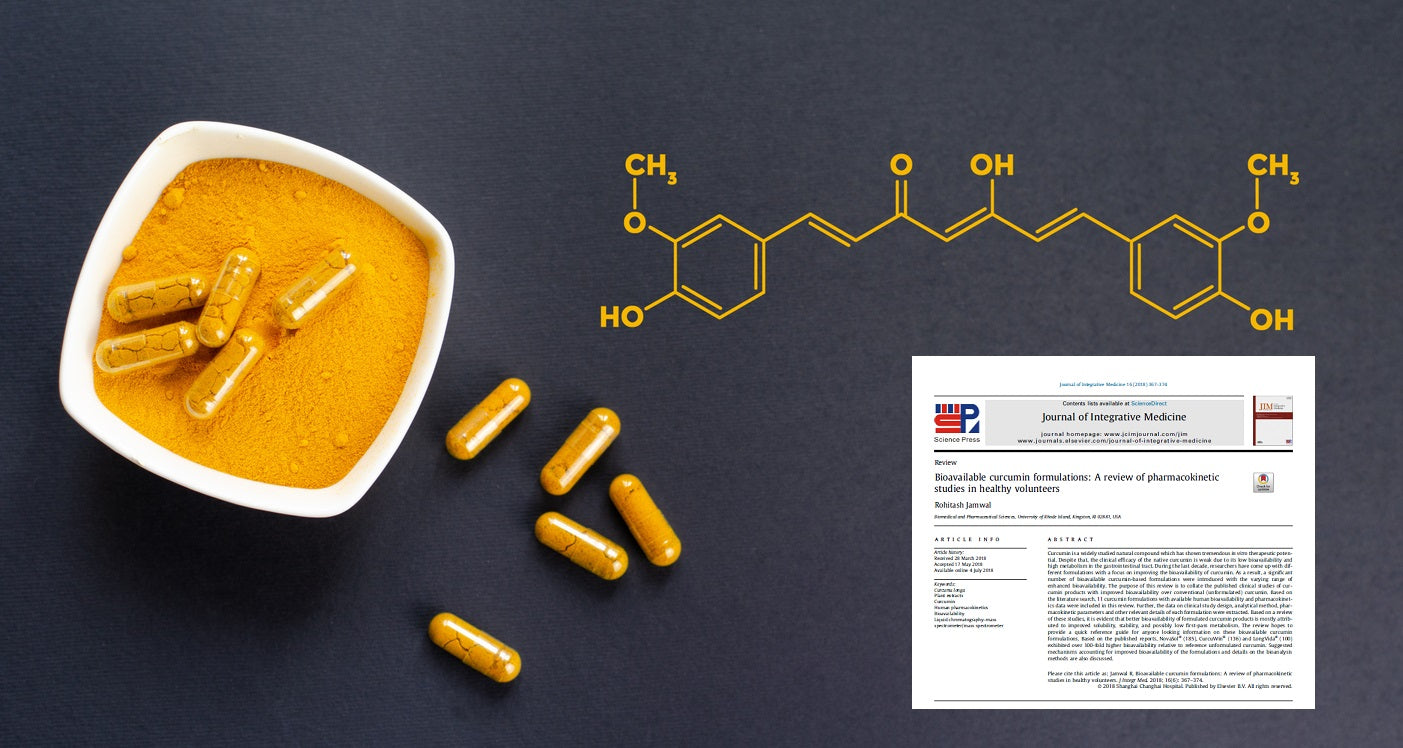I always laugh when I read a brand claiming to be the “Best on the Market.” Really? The best in what way? The supplement market reminds me of what I read growing up about the Wild West: there were few sheriffs to look after a vast expanse and so citizens needed to step up and self-govern.
You see, in 1994, the FDA deregulated the supplement industry. As a trade-off for this, each supplement bottle needs to say in a box on the label:
“These statements have not been evaluated by the Food and Drug Administration. This product is not intended to diagnose, treat, cure, or prevent any disease.”
While I am a fan of this deregulation, it does open the industry up to claims on labels like “best on the market,” that are not true. Curcumin is one such supplement.
Curcumin is fat-soluble, which means that it is very difficult to absorb into the body. In other words, it has low bioavailability. Companies have devised different strategies to make curcumin more bioavailable. Many of these highly bioavailable curcumins claim to be the “best.”
A researcher from Rhode Island, Rohitash Jamwal, published a paper in 2018 that looked at 11 curcumin brands to see which, indeed, was the most bioavailable. The study reviewed 11 different human clinical trials that compared the various bioavailable brands against unformulated, plain curcumin where curcumin metabolites were measured in human plasma with liquid chromatography–mass spectrometer (LC–MS).
From the research, Jamwal found that curcumin brand that we will call "product N" had the highest bioavailability of 185 times higher than regular curcumin, as seen in the graph.* The product N formulation is 7% curcumin powder and 93% polysorbate 80, which is a synthetic detergent used in foods to emulsify. As you might imagine, many in the natural products world take issue with having polysorbate 80 in their supplement!

But even with product N's high bioavailability, does enough curcumin get into the system in order to deliver a biologically relevant dose? A dose like you would see in the amazingly impressive research when curcumin is put on cells directly?
Knowing about Jamwal’s research, we set out to compare our highly bioavailable curcumin, CurcElite®, with product N and one that Jamwal did not look at, but that we like product UC. What we found in our internal study can be seen in the graph below. Our lab does not own a LC-MS, so we utilized our plate reader to look at the fluorescence of the curcumin metabolites in urine. If the curcumin gets into the body, its metabolites will be excreted in the urine.
In the figure below, each bar represents the average fluorescence of three urines. The baseline is the background fluorescence in second morning void. After the collection of this urine, two capsules of curcumin were taken, and urine was collected again after two hours.

The UC and N forms of curcumin did not register above the background fluorescence. Our BrocElite Professional with Curcumin (sold to clinicians only) was about three times higher than baseline. The CurcElite® was about seven time higher than baseline. In looking at the absolute amounts of curcumin in urine, CurcElite® yielded 13 micrograms of curcumin per mL of urine vs. product N, which had 0.6 micrograms of curcumin per mL of urine. This means there was 21 times more curcumin metabolites in urine after taking CurcElite® vs product N.
But this is the data we currently have. And if product N is indeed the best curcumin product among the highly bioavailable brands of curcumin, this study puts into perspective how well the curcumin in CurcElite® gets absorbed.
If you currently take a curcumin product, I recommend giving CurcElite® a try because I think you'll be glad you did. As always, believe in what we have enough to provide an unconditional, 100-day money back guarantee on your first bottle.
*We are not using the names of the brands here so that we do not get sued by the respective companies. But product N can be found in the paper linked above.







7 Comment
Why didn’t they compare the curcumin from Nanofy?
Their’s is made with nano technology.
———
BrocElite replied:
We only compared the top rated brands at the time of testing. We may consider this brand in future testing. Thank you!
Hi Kimberly, ours is different in that it makes it through the gut lining and can impact the body systemically – not just locally. Every other brand we’ve tested failed to do this. The ones that did make it through the gut lining caused increased inflammation due to the scoring that occurred on the process. I cannot speak to the specific brand you mentioned since it’s not one I’m familiar with. We do have a 100 day money back guarantee so that you can try it for yourself and see the results risk-free!
Hi Jan, if curcumin is being excreted in urine, we can know that it was absorbed through the gut lining and therefore impacted the entire body. Most curcumin stays in the gut and is therefore not systemically bioavailable. If it stays in the gut, it’s excreted in feces. The bioavailability of curcumin (and other supplements that struggle to get through the gut lining) can be directly measured by how much is seen in the urine. Hope this helps!
I have been given my son curcumin for his ulcerated colitis. Hoping and praying that it would Bring down the inflammation. Terry’s naturals is the brand we’ve been using. Can you tell me how yours is different and help him more
Thank You